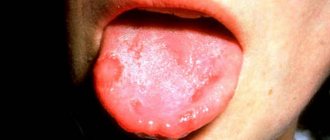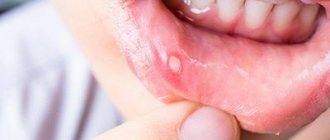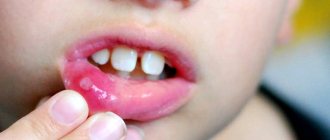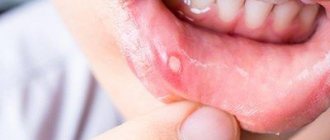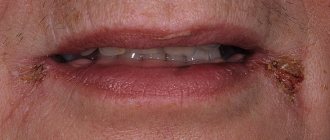| Type of stomatitis | Possible reasons | Features of the flow |
| Viral | Causative agents of herpes, measles, chickenpox, which are transmitted by airborne droplets and by contact with a carrier. | The patient's general condition is serious: the temperature rises above +380C, diarrhea, nausea and uncontrollable vomiting are possible. Bubbles filled with clear liquid appear on the mucous membrane of the mouth. Very quickly they burst, forming ulcers. But after 3-4 days they become crusty and heal on their own. The disease lasts 1-2 weeks. |
| Fungal | Candida fungus, the activity of which is provoked by decreased immunity, vitamin deficiency or hypothermia. | Fungal stomatitis most often affects children, the elderly and pregnant women. Recognizable by a white coating on the palate, tongue, and inner surface of the cheeks. Patients complain of pain while eating. |
| Aphthous (bacterial) | Decreased general and local immunity due to infection. Pathogens: staphylococci, streptococci, gonococci, mycobacteria. In women with chronic gastritis or gastric ulcer - Helicobacter pylori activity. | Aphthous stomatitis is dangerous due to its long course and high probability of relapses, which usually occur in spring and autumn. On the mucous membrane, aphthae are visible - round blisters surrounded by a scarlet border and covered with a grayish coating. They can be single or multiple, and sometimes merge into extensive lesions. |
| Catarrhal | Tartar, untreated caries, poor oral hygiene. | This is the same stomatitis of “dirty hands”. It occurs more often than other varieties, but it also occurs much more easily. You can recognize it by the pronounced soreness of the mucous membrane, its swelling and dryness. Bleeding of the cheeks, a yellowish coating on the tongue and the inner surface of the cheeks may be observed. Accompanied by an unpleasant odor from the mouth. |
| Allergic | Certain foods (often strawberries, citrus fruits), medications, oral care products, and even the materials from which crowns, veneers, fillings, and dentures are made can act as an allergen. | Allergic stomatitis is considered the most severe type of the disease. Patients complain of unbearable burning and pain even when trying to breathe air through their mouth. |
| Nicotinic | Long-term smoking | Hot smoke regularly irritates the soft and hard palates. At first, the tissues become denser, but for the patient this process is painless and therefore goes unnoticed. In the advanced stage, all soft tissues are covered with multiple ulcers. And doctors confidently call nicotine stomatitis a precancerous disease. |
Stomatitis and ulceration of the oral mucosa during pregnancy can be caused by sodium lauryl sulfate (SLS), an ingredient in most toothpastes. It is with its help that manufacturers achieve abundant foam formation. If this component is not directly indicated in the composition, you can find out about its presence by the innocuous phrase: “foaming agent obtained from coconuts.”
Do treatment methods for stomatitis depend on the timing of pregnancy?
First of all, we must keep in mind that the first, second and ninth months are the most undesirable in terms of any intervention. Therefore, it is better not to treat stomatitis during these periods. The methods depend on the form of the disease: candidal stomatitis is treated with antifungal drugs, viral - with antiviral drugs, bacterial - with antibiotics, and in the allergic form of stomatitis, contact with the allergen is excluded or antihistamines are prescribed. Whatever method is used, the dentist takes into account the patient’s condition and selects exclusively harmless means of therapy.
How to treat stomatitis in pregnant women?
Treatment of stomatitis in pregnant women is complicated by the fact that most medications for expectant mothers are prohibited. Restrictions are especially strict in the first trimester of pregnancy. And gentle therapy in the form of rinsing with herbal decoctions and more thorough oral hygiene is often ineffective.
That is why, at the first symptoms of stomatitis, the expectant mother should run to see a doctor. Firstly, the initial stage of the disease is treated faster and easier. And secondly, only an experienced specialist will be able to select therapy so that it does not harm the unborn baby, but at the same time copes with the disease.
Do not ignore preventive visits to the dentist.
It is enough to visit a specialist 1 – 2 times a year, which will allow you to promptly identify any dental problem at an early stage of development. This means that its elimination will be quick, easy and without complications.
By clicking the “request a call” button you agree to the personal data processing policy.
Medications
For any type of stomatitis, repeated treatment of the oral cavity with local antiseptics - furatsilin or chlorhexidine - is prescribed. Their task is to suppress pathogenic microflora.
Depending on the type of disease, medications also change:
- viral stomatitis
requires the use of antiviral agents (Acyclovir, Gerpevir). But all drugs in this group have an aggressive effect and are strictly contraindicated during pregnancy. Therefore, dentists prefer to make do with gentle local treatment and prescribe vitamins to boost immunity. And after the birth of the child and completion of the lactation process, it will be possible to carry out full treatment; - aphthous stomatitis
brings treatment of the underlying disease to the forefront. And here the dentist can only recommend rinses, pain-relieving ointments, and transfer the prescription of drug therapy to a gastroenterologist, phthisiatrician, venereologist, or infectious disease specialist. They will decide how appropriate antibacterial therapy is. Ideally, it should be postponed until after lactation; - allergic stomatitis
is treated with antihistamines (Loratadine, Cetirizine). But the most important and most difficult thing is to identify the allergen and completely eliminate contact with it. Sometimes allergy tests will be required to detect the pathogen; - advanced candidal stomatitis
is treated only with antifungal drugs (Futsis, Fluconazole). Many of them are safe for the fetus and mother, but, nevertheless, they should be prescribed exclusively by a doctor; - Treatment of catarrhal stomatitis
begins with relief of symptoms with local antiseptics, after which the expectant mother is recommended to undergo full dental treatment, including removal of tartar.
If stomatitis is too painful, the doctor prescribes local anesthetic ointments, sprays and rinses. For example, Hexoral Tabs can be safely used at any stage of pregnancy, as well as during breastfeeding. "Lidocaine Asept" is used in the treatment of stomatitis in pregnant women, but is strictly contraindicated for nursing mothers.
One of the most important tasks for stomatitis is to boost immunity. Therefore, in any case, the expectant mother will be recommended to take multivitamins and, separately, vitamin C, for example, in the drug “Cevicap”. It is important to strictly follow the dosage: in the later stages, excess vitamin C can cause premature birth.
Folk remedies
Treatment of stomatitis in pregnant women is a rare case when official medicine is not only not against traditional methods, but also recognizes their safety and effectiveness. Moreover, you can increasingly see rinses and ointments on sale, which are based on recipes passed down by our ancestors from mouth to mouth for many generations. A striking example is “Sage extract with vitamin C”, Dr. Theiss.
As a rinse for stomatitis, folk wisdom recommends using decoctions and infusions of herbs that have a powerful anti-inflammatory and healing effect.
| 1 | Sage decoction | Take 2 teaspoons of dried sage for half a glass of water, boil, leave to steep for 10 minutes. When the broth has cooled to room temperature, rinse your mouth with it for at least 1 minute. Afterwards, rinse your mouth with clean water. |
| 2 | Chamomile decoction | Take either 1 tablespoon of dried flowers or 1 bag of chamomile tea. Pour a glass of water, bring to a boil, leave to simmer over low heat for 5-10 minutes. |
| 3 | St. John's wort infusion | Pour boiling water over 20-30 g of dry St. John's wort herb. Leave for 2 hours. Afterwards, the broth needs to be strained and diluted with a small amount of warm water. |
| 4 | Yarrow infusion | Only the inflorescences of the plant are used to treat stomatitis! Pour 2 tablespoons of dried flowers into 1 glass of water. Bring to a boil and continue cooking for another 20 minutes. Strain. |
| 5 | Melissa decoction | Pour 1 tablespoon of lemon balm leaves into 1 cup of boiling water. Cook in a water bath for 15-20 minutes. Strain. Use after cooling. |
| 6 | Oak bark decoction | Pour 2 tablespoons of crushed oak bark into 2 cups of poda. Bring to a boil, reduce heat and continue cooking for another 5 minutes. Leave the broth to infuse. When it cools to room temperature, strain. |
You need to rinse your mouth with herbs 4-5 times a day, and before going to bed, it is useful to hold a cotton swab moistened with a decoction or infusion directly on the affected areas of the mucous membrane for 10 minutes. Very important: only freshly prepared decoction and infusion have medicinal properties. Therefore, you need to prepare them daily!
If you don’t have the time or desire to prepare it yourself, you can buy calendula tincture at the pharmacy. For rinsing, you need to dilute it in the following proportion: 1 teaspoon to 100 grams of water.
Alas, if the dentist has diagnosed viral or fungal stomatitis, herbal decoctions will be useless.
A decoction of rose hips and blueberries improves the immune system for stomatitis. Moreover, it is useful to consume the latter in any form: eat fresh berries, prepare mousses from frozen blueberries and brew their leaves instead of tea.
What should be the prevention of stomatitis during pregnancy?
The most important thing is to take good care of your oral cavity. Ask your dentist to recommend a suitable antibacterial toothpaste. Be sure to use mouthwash and dental floss. A healthy diet is also of great importance: balance your diet, do not get carried away with sweet carbohydrate foods (bacteria love them very much). Take vitamins - they will help support the body during the difficult period of bearing a baby.
Stomatitis during pregnancy: before and after photos
The dangers and consequences of stomatitis in pregnant women
Stomatitis is not a harmless disease at all! Developing against the background of reduced immunity, it further weakens the body with waste products of fungi, viruses or bacteria. And since the circulatory system of mother and fetus is still one, the danger is enormous! In the early stages, when all organs and systems are being formed, it is stomatitis that can cause a program failure, and the child will be born with a pathology.
Another danger is the transition of stomatitis to a chronic form, when the disease will subside only for a while, and after a few weeks it will reappear. Each time the course of the disease will become more and more severe: the simplest catarrhal variety will quickly turn into ulcerative stomatitis. Well, it’s not far from gangrene, which affects not only soft tissues, but also the bones of the jaw apparatus.
And even when treatment is started on time, you cannot relax! Difficulties in eating and drinking that are quite natural for stomatitis can lead to dehydration. And not only for the expectant mother herself, but also for her baby. Therefore, no matter how difficult it may be, you need to make sure that you drink at least 1.5 liters of water per day.
Signs of the disease
First news
The first signs of the disease usually appear at 2 months of pregnancy and reach a peak at 8 months. If there are no other aggravating factors, symptoms will regress after childbirth.
Symptoms of gingivitis in pregnant women
Signs of the disease are no different from the usual symptoms of gingivitis and include:
- Loose, red, very sensitive and swollen gums;
- Bleeding gums when brushing with a toothbrush or special floss;
- Unpleasant foul odor or taste in the mouth.
Diet for stomatitis
In order not to aggravate the situation with stomatitis, you should avoid sweet, spicy and salty foods. It is not recommended to eat mushrooms and legumes. But most importantly, all food should be of a warm, delicate consistency, so as not to further injure the mucous membrane. It is very important that the menu is rich in vegetables and fruits. It is better to stew vegetables and prepare nutritious cream soups from them. And fresh fruits are especially good in the form of smoothies.
In some cases, diet alone will be enough for the expectant mother to forget about stomatitis after 1-2 weeks. But only a doctor can rule out the bacterial, fungal or viral nature of the disease, in which it will not be possible to cope with the disease so easily.
Experts' opinion
The effectiveness of ASEPTA rinses has been repeatedly proven by clinical studies. For example, according to A.K. Iordanishvili, Doctor of Medicine Sc., professor, North-Western State Medical University named after. I.I. Mechnikov, based on a study of 46 people suffering from gum inflammation, it was found that the use of mouth rinses “ASEPTA PARODONTAL ACTIVE” and “ASEPTA PARODONTAL FRESH” (JSC “VERTEX”, Russia) allows not only to improve oral hygiene and reduce inflammatory processes in the gums by 55.37%, but also reduce the number of relapses of localized periodontitis by 21.36%.
Sources:
- Prevention of recurrence of localized periodontitis in young A.K. YORDANISHVILI, Doctor of Medical Sciences, Professor, North-Western State Medical University named after. I.I. Mechnikov, Military Medical Academy named after. CM. Kirov, International Academy of Sciences of Ecology, Human Safety and Nature.
- Report on clinical trials to determine/confirm the preventive properties of commercially produced personal oral hygiene products: mouth rinse "ASEPTA PARODONTAL" - Solution for irrigator." Doctor of Medical Sciences Professor, Honored Doctor of the Russian Federation, Head. Department of Preventive Dentistry S.B. Ulitovsky, doctor-researcher A.A. Leontiev First St. Petersburg State Medical University named after academician I.P. Pavlova, Department of Preventive Dentistry.
- Report on determining/confirming the preventive properties of commercially produced personal oral hygiene products: Asepta toothpaste used in combination with Asepta mouthwash and Asepta gum balm Head. Department of PFS Doctor of Medical Sciences Professor S.B. Ulitovsky St. Petersburg State Medical University named after Academician I.P. Pavlova. Faculty of Dentistry. Department of Preventive Dentistry.
Causes of the disease
Gastritis is an inflammatory disease of the gastric mucosa.
Gastritis manifests itself in inflammatory processes that affect the gastric mucosa. This lesion leads to disruptions in the functioning of the organ.
It is believed that most pregnant women experience gastritis if this disease has already visited them before. This rule applies to 75% of girls.
The bacterium Helicobacter pylori that enters the digestive tract is another factor that provokes gastritis.
Usually it ends up in the stomach long before the first signs of the disease appear. Having become infected even before pregnancy, women do not even suspect it, because the symptoms may not be felt for a long time.
An exacerbation begins at the moment when it is provoked by other factors. These include changes in hormonal levels, under the influence of which signs of the disease appear.
Since significant changes occur in the human body during pregnancy, all of them can also become stimulants of gastritis. This includes iron deficiency anemia, disruption of the endocrine system, and infection. There are other reasons for the development of this disease:
- non-compliance with the rules of a balanced diet;
- frequent inclusion in the diet of foods containing refined carbohydrates;
- eating foods containing preservatives, dyes, and harmful flavors;
- eating large amounts of food;
- bad habits;
- experiences, being in a stressful state.
Causes of aphthous stomatitis
The exact cause of this disease remains unclear. It is assumed that HRAS is of an allergic nature; allergens can include: food, medicine, toothpastes, dust, worms.6,7 It is also assumed that the cause of the disease is an autoimmune reaction.8 A hereditary predisposition to this disease can be traced.
Predisposing factors:
- diseases of the digestive system (gastritis, gastric ulcer, cholecystitis, Crohn's disease)
- dysbacteriosis
- stress
- deficiency of iron, vitamins B1, B2, B6, B12, C
- chronic tonsillitis, otitis and rhinitis
Impact of the disease on the course of pregnancy and child development
Untreated stomatitis is extremely dangerous for the development of the fetus. Bacteria actively multiply in the oral cavity. Lack of treatment leads to the spread of infection through the blood vessels and can provoke pathologies in fetal development.
In severe, advanced forms, increased temperature and heat are observed, which leads to dehydration of the mother’s body and negatively affects the child.
If not treated in a timely manner, the disease can pass from the mother to the embryo.
First aid at home
If the symptoms of the disease occur to a pregnant woman on a weekend or at night, and it is not possible to immediately consult a doctor, then before the appointment, available means can be used to relieve the symptoms, for example, rinsing with a baking soda solution. The solution is prepared at the rate of 1 tablespoon per glass of water. It is necessary to rinse every 30 minutes.
Also, to alleviate the symptoms of the disease, you can use decoctions of well-known medicinal plants: chamomile, nettle, St. John's wort, calendula. The prepared liquid must be cooled to room temperature and rinsed with it in the mouth.
To enhance the therapeutic effect, you need to choose the right toothpaste. It is better to choose a product that has an anti-inflammatory and antibacterial effect. It will help small wounds and mucous membrane defects heal faster.
Symptoms
Painful wounds, erosions and ulcers form on the inner surface of the cheeks and lips, on the gums and palate. Visually, they appear as small white spots with a red border ranging in size from 1 to 10 mm. During eating or hygiene procedures, they may bleed and hurt. The disease may be accompanied by increased salivation, bad breath, loss of taste, swelling and pigmentation of the tongue, and high fever.
Stomatitis on the inside of the lip
Preventive measures
Tips to help prevent the development of the disease:
- Thorough cleaning of not only your teeth, but also your tongue.
- Regularly replacing your old toothbrush with a new one (at least once every two to three months).
- Consume only thoroughly washed fruits and vegetables.
- The diet should be rich in minerals and vitamins.
- Avoid seeds and nuts, which carry huge amounts of bacteria.
- Try to drink only warm water at room temperature.
Prevention of HRAS
Prevention should be aimed at monitoring the state of health in general, treating chronic diseases, and it is necessary to undergo regular examinations regarding the existing disease. Hardening and strengthening the immune system have a good effect. You need to visit the dentist to monitor your oral health once every 3-4 months to ensure timely detection of relapses. You should avoid using toothpastes, hygiene products with dyes or identified allergens. Taking antibiotics should only be done under the supervision of a doctor. It is recommended to avoid strong psycho-emotional stress and regularly carry out wet cleaning of the premises.
It is worth paying attention to Tantum® Propolis .
Tantum® Propolis
Propolis has an immunostimulating effect, promotes healing, vitamin C, which is part of it, is responsible for regeneration, participating in the synthesis of collagen.
Propolis also has antiviral and antifungal effects. Therefore, vitamin therapy Tantum® Propolis is an effective means of preventing stomatitis12 Find out more
